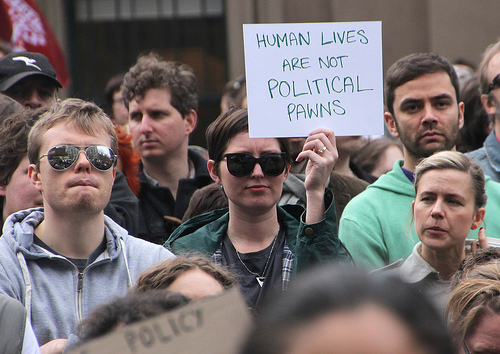“Canada is deeply concerned about the situation in Sri Lanka. The absence of accountability for the serious violations of human rights and international humanitarian standards during and after the civil war is unacceptable.”
Prime Minister Harper made this statement earlier this month, announcing that he would not attend the upcoming Commonwealth Heads of Government Meeting in Sri Lanka to protest continued human rights abuses by Sri Lanka’s government against its Tamil minority citizens.
Regardless of what you think about the usefulness of diplomatic snubs, it’s heartening to see Harper not only acknowledge these human rights abuses, but take action as well.
Should Harper continue to take this stand, his next step should be to dismantle the harsh refugee policy that he’s put in place. It’s only logical. There is, after all, a direct correlation between recent changes to Canada’s refugee policy and the human rights situation in Sri Lanka.
Sri Lanka’s bloody civil war and the MV Sun Sea escape to ‘freedom’
Sri Lanka was embroiled in civil war for more than 25 years, fighting for the independence of its Tamil community. The bloody culmination came in early 2009, when the Sinhala majority government met violence with violence, surrounding the separatist rebel group the Tamil Tigers — along with thousands of Tamil civilians — and squeezing them into a tighter and tighter area, until the fighting was done. There were war crimes on both sides, but the government emerged the victor.
For the Tamils, the war may have ended, but the fear and oppression continued. Amnesty International published several reports in 2010, highlighting continued government-led abuse, including arbitrary arrests, imprisonment and murders. Many Tamils fled, some escaping on smuggler’s boats.
Which is where Canada comes in. In August 2010, one of these boats, the MV Sun Sea, entered Canadian waters off the coast of B.C.
Canada’s treatment of MV Sun Sea refugees
Canada has been known as a nation both generous and welcoming to refugees, and until August 2010, this reputation was more-or-less well-earned. But the MV Sun Sea changed all that.
Although we’ve had plenty of experience with refugee boats, this one in particular caused downright hysteria in Ottawa. The reason for this hysteria is not entirely clear, though it seems Harper and his ministers were heeding the warnings not of Amnesty International but rather of the Sri Lankan government — a questionable source given the circumstances.
As a result, the Tamil asylum seekers were declared criminals and terrorists before their boat had even docked. Even the Public Safety Minister was brought in to stand side-by-side with the Immigration Minister, stoking fears of threats to national security.
Together the two ministers announced sweeping changes to Canada’s refugee policy — changes that violated both the Canadian Charter and international law. Changes designed explicitly to keep refugees like the Tamils from coming to Canada.
Under the new policy, the Immigration Minister had powers to declare an arrival of refugees as “irregular,” ushering in a year (later changed, under duress, to 15 days) of arbitrary and mandatory detention, including for children. Even when granted refugee status, these refugees were banned from applying for permanent residence for five years, placing them in a debilitating legal limbo. Later changes gut the already basic “temporary” refugee health plan, and restricted its use to public health risks. Groups of concerned doctors began treating refugees pro bono.
Riding the momentum, the Conservatives created a further list of “designated” countries that stripped health care and other rights from refugees. Refugees have been hit with restrictions to travel and family sponsorship, a loss of precious time to prepare for hearings, and a loss of appeals, including those for humanitarian considerations.
Hope for Harper’s next steps
All this in reaction to one ship of asylum seekers, a ship whose passengers represented just two per cent of the total number of asylum seekers arriving in Canada each year. A ship whose passengers were fleeing a nation that our government now acknowledges was — and is — awash in human rights abuses.
“We remain disturbed by ongoing reports of intimidation and incarceration of political leaders and journalists, harassment of minorities, reported disappearances and allegations of extra judicial killings.”
Again, this is from Harper’s recent statement on the Commonwealth meeting. Now that he recognizes why Tamils continue to flee Sri Lanka as refugees, will Harper consider reversing the policy he put in place to deter these very refugees?
“If the Commonwealth is to remain relevant,” says Harper, “it must stand in defence of the basic principles of freedom, democracy and respect for human dignity, which are the very foundation upon which the Commonwealth was built.”
My hope is that someday our Prime Minister will reflect on his own words, and take them to heart.
Correy Baldwin is a freelance writer and editor based in Montreal, and is an editor-at-large with The Media Co-op.
This piece originally appeared on Bones for War and is reprinted with permission.




